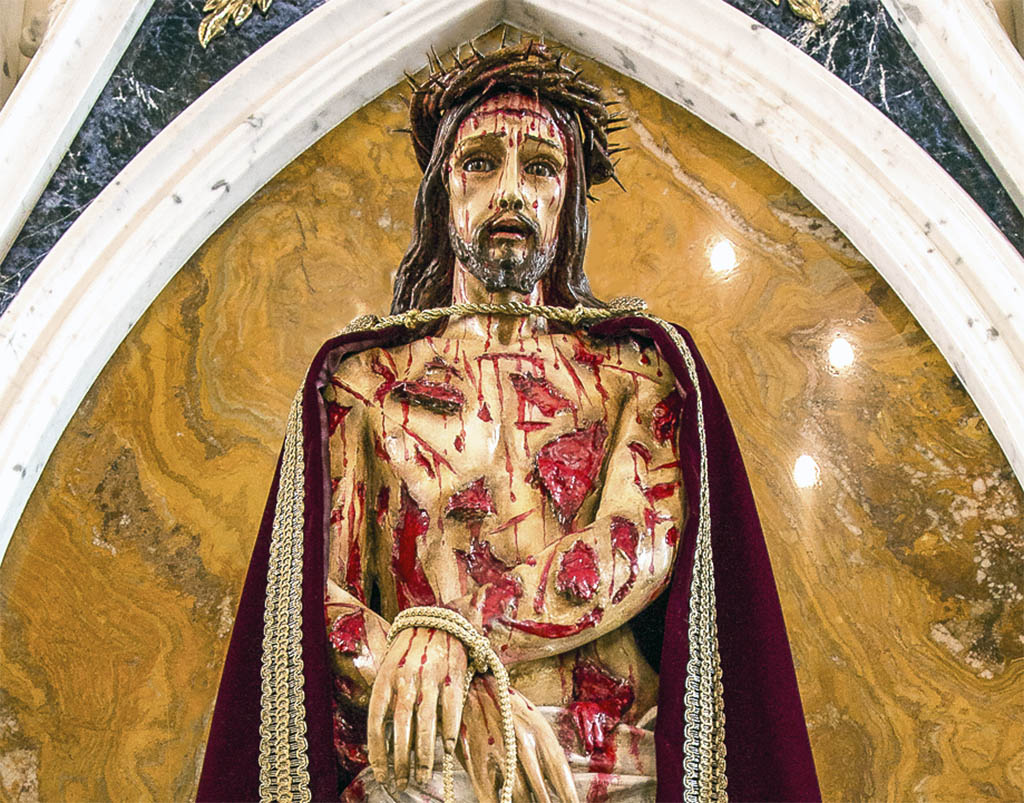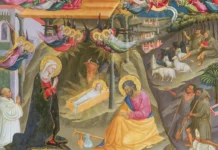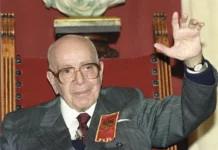The unspeakable sorrows of Jesus in His Passion teach us to carry our own cross. They invite us to see suffering as a necessary means to reach Heaven and the most sublime way to glorify God.
It is a long-standing tradition among us to say a few words on the passage of the Gospel referring to the Passion of Our Lord Jesus Christ, during these days of Holy Week. And, since today is Holy Thursday, it seems appropriate to read and comment on some passages from the concordance of the Holy Gospels composed by Archbishop Duarte Leopoldo e Silva,1 as a preparation for the great commemoration that will be held tomorrow: the Death of Our Lord Jesus Christ on the Cross and the Redemption of humanity.
Let us begin the reading at the moment in which the Last Supper has ended and Our Lord and the Apostles set out for the Garden of Olives.
The perspective of tragic events
Archbishop Duarte writes: “After these words, having recited the hymn of thanksgiving, Jesus left with His disciples and crossed over the Kidron valley. Going to the Mount of Olives, as was customary, they came to a place called Gethsemane, where there was a garden which He entered with His disciples.
“Having arrived there, Jesus said to them: ‘Sit here, while I go yonder and pray. Pray also that you may not enter into temptation.’”
We see a clear distinction here between the feast of the institution of the Eucharist, the first Mass, and the Passion of Our Lord Jesus Christ. The Last Supper has a festive character, over which are projected the shadows and sadness of the tragic events that will follow. With the conclusion of the thanksgiving, the feast has ended, and so He begins to confront the sorrow, the tragedy, the great struggle. His life had already been marked by battles, but at this moment they reach their peak, their apogee.
To get a real sense of the events that the Gospel narrates in such simple language, we must imagine the state of soul of Our Lord Jesus Christ, the dispositions of His Sacred Heart during these episodes.

Shadows that deepen and lights that begin to shine
There were two reasons why the Last Supper was sad for Him: firstly, because the Redeemer saw the Passion that would soon begin, for He obviously had knowledge of everything.
But also due to the pitiful situation of the Apostles. The narration of the Last Supper contains clear indications of their shortcomings and mediocrity. What must have wounded the Sacred Heart of Jesus, piercing it more deeply than the lance of Longinus, was the infidelity of the Apostles, and the fruitlessness of the work that Our Lord had initiated with them.
The Redeemer, showing them an unprecedented manifestation of His love by instituting the Holy Eucharist and offering Himself to them in communion, sees those souls receive this incomparable gift with coldness: St. Peter, is grandiloquent; Judas, is in the despicable state that does not deserve mention; and the other Apostles are preparing to flee.
There is the touchingly beautiful episode of St. John the Evangelist, the beloved disciple, who rests his head upon Jesus’ breast and asks Him the identity of the traitor; Our Lord tells him who it was. Yet this disciple “whom Jesus loved,” would flee with the others.
And so the shadows deepen at the very moment that the splendours of the Mass begin to shine. And Our Lord Jesus Christ, who had knowledge of all times and of everything that would take place, delighted in the idea of the glory that the Holy Eucharist and the Mass would give to the Eternal Father, with the adoration He would receive from the Saints and the souls of the elect, until the end of the world.
A battle waged in solitude
All these sentiments penetrated His Heart, and constituted a sort of twilight of sadness mixed with joy. At a certain moment, the light withdraws and Our Lord begins to enter more deeply into the darkness of His suffering and death. Each step is more tragic than the last.
He walks, but He walks resolutely, without a moment of respite or relief – save when He receives the Angel who consoled Him, and when He sees Our Lady and is comforted by her presence along the Via Sacra – reaching the point of His exclaiming from the height of Calvary, at the apex of the suffering: “My God, my God, why hast Thou abandoned Me?” (Mt 27:46).
And until the consummatum est, that is, until saying “all that was to be suffered has been suffered,” the shadows only thickened for Him.
Therefore, we can imagine Him, sad after the Supper, walking through the streets of Jerusalem with the Apostles on the way to Gethsemane, where His agony begins – in Greek, agony means battle; athletes were called agonists, because they fought in the arena –, in other words, the great battle that He will wage alone. And solitude is one of His tragedies during the Passion, until the moment in which the Blessed Virgin Mary appears.
Our Lord withdraws, for He feels that no one is worthy to be near Him at this moment, and He says to the somnolent and indifferent Apostles: “Sit here, while I go yonder and pray. Pray also that you may not enter into temptation.”
When He draws away, instead of an Apostle asking Him: “Lord, why are You isolating Yourself?” or “Lord, can I not help You?” they begin to vacillate, and Jesus starts to experience the tragedy in His soul.
Oppressed by mortal sadness
Archbishop Duarte continues: “And taking with Him Peter and the two sons of Zebedee, James and John, He began to be greatly distressed and troubled, and was beset by sadness and dejection. He said to them: ‘My soul is very sorrowful, even to death; remain here, and watch with Me.’”
Our Lord chose to keep these Apostles with Him, while He left the others behind, and in this greater intimacy He explained to them: “My soul is sorrowful, even to death.” And then He asked them: “Watch”, in other words, “Stay awake with Me. I want to have the consolation of your presence and your compassion, while I am undergoing this tremendous suffering.”
And the concordance adds: “And He withdrew from them about a stone’s throw, and He fell on the ground and prayed that, if it were possible, the hour might pass from Him.”
Let us think of the Holy Shroud of Turin: that gaze, that majesty of Our Lord. What would it mean to someone however small his soul, to see that countenance upon which was summarized all the glory of the universe, that gaze which synthesized in an unimaginable and superlative degree all the holiness possible in every soul of every age, the intelligence, power, goodness, in short, every quality; to contemplate that face, the most perfect mirror of God that had ever been created!
We can imagine Our Lord – a tall man –, with a white tunic, on what perhaps was a moonlit night, with the shadows of the trees causing a play between darkness and light. How poignant it would have been to see this majestic man all alone… Suddenly, a great white figure that bows and falls with his face to the ground! Then, prostrate, the King of all glory prays, oppressed by a sadness that inundated Him until to His death.

“Not My will, but Thine be done”
And He said in His prayer, which the Apostles heard, so that afterwards they could recount it and leave these memorable words registered for all eternity: “Father, if Thou art willing, remove this cup from Me; nevertheless, not My will, but Thine, be done.”
It is perhaps the sweetest and, at the same time, most powerful prayer that has ever been formulated on earth.
The sweetest because, seeing that the Eternal Father willed torment and martyrdom for Him, and was going to take Him as a victim, Jesus presents Himself filled with love and calls Him “My Father,” the most tender words that one person can address to another.
“My Father,” He says, as one who groans! He knows He will suffer that torment, necessary according to the designs of God, for His glory. And Jesus, in His most holy humility, as though abandoned, separated from His divinity, remains in that darkness. His human nature entreats: “If it be possible to avoid this torment, take it away.” Just as one who says: “The weight of the suffering is so great that I am compelled to ask Thee: for the sake of mercy, is there not some way to remove it?”
However, Our Lord immediately adds: “If it is not possible, then do Thy will and not mine.” Thus, we see strength in addition to tenderness: “If it is not possible, then although I cannot endure it, and I do not have the means, I will begin; because nothing exists that I am not ready to undertake to fulfil Thy will. I am the strong man par excellence, crushed, broken and annihilated. Nevertheless, I am ready to fight until the end. Send Me Thy strength, and I shall do Thy will.”
It is, then, a complete submission, a total obedience, a loving act without the slightest revolt or the sensation that God will not be merciful with Him; He sees mercy even at the moment in which mercy would seem impossible.
There is a mystery here. Could not God the Father have accepted a drop of Our Lord Jesus Christ’s Blood, and thus redeemed humanity?
Truly, one drop of the Blood of Christ has infinite value. And theologians say that even the Blood He shed in the circumcision would have not only been sufficient, but superabundant, to redeem humanity. However, there was a plan of God, mysterious to us, by which those innumerable torments were necessary.
The colloquy of the Man-God with the Eternal Father, at once so tragic and so intimate, reveals to us something of the relationship between them. One sees that, for some reason, the Father and He Himself, as the Second Person of the Blessed Trinity, did not wish to make this possible. Thus, we are given to glimpse a little of this relationship, and this little is of extraordinary sublimity.

Every man must carry his cross
Jesus desired that humanity see all of His sufferings, so that each one of us would have the courage to bear our own suffering. If the God-Man had come to earth and suffered only a little, shedding one droplet of blood, we would have been redeemed. But the lesson of resignation to suffering, of the acceptance of suffering as the apex of existence, would have been missing. Suffering cannot be considered a disaster, a burden, something incomprehensible that should not happen. On the contrary, it is the necessary path for man to arrive where he ought to arrive, the road that leads him to his ultimate destiny.
Each one of us was born to carry a cross, to undergo a Garden of Olives, to drink a chalice and to have our moments of agony, in which we say to God Our Lord: “My Father, if it be possible, take this chalice from me, but may Thy will be done, and not mine.”
We would not understand that man was born to give glory to God, above all by suffering – this core idea, fundamental in the formation of the true Catholic – if it had not been shown to us in the most sublime and compelling example, which is Our Lord Jesus Christ dying on the Cross.
We see here a contrast with the modern spirit, according to which man’s end on earth is to achieve success, health, amass wealth, enjoy life and when there is no longer any way out, to die at an old age. And, throughout life, to ensure the greatest possible degree of security, so that one is spared not just suffering, but even the fear of suffering. This outlook is essentially pagan. To evaluate life like this is to evaluate it as a pagan does. Catholic formation prepares people for suffering, for it is founded on Our Lord Jesus Christ, whose life was centred on this supreme hour of sorrow.
How should we look upon the sufferings of our life?
This leads us to ask how we should consider the sufferings in our life, the greatest of which is, undoubtedly, our own sanctification. A serious process of sanctification always brings suffering, and much suffering. And if someone were to tell me that he does not suffer, I would be immediately inclined to ask: “Then you do not sanctify yourself?” For there is no sanctification that is not accompanied by suffering.
With our sanctification in mind, we should ask questions such as the following:
Do we combat the impulses within us, stemming from both original sin and our evil actions? What do we do, not only to repress these evil impulses, but to practise the virtues opposed to them?
Do we accept our limitations with regard to intelligence, or in the physical or social sphere, such as a lack of status, wealth or charm?
There are awkward people, with whom others avoid socializing; at most they receive a cursory greeting. There are also those who are very witty, and are popular for the diversion they provide, and who try to draw us into their buffoonery. How do we accept the need to resist this solicitation?
Only those who carry their cross are truly serious
In all of this, each person has a cross. And Our Lord Jesus Christ shows us the essential role of suffering. One of the reasons for which it was not possible for the Eternal Father to heed Jesus’ prayer was so that men would have this example.

When Napoleon’s star was still on the rise, before he had become emperor, a flatterer said to him: “General Bonaparte, why do you not proclaim yourself a god?”
When the ancient Roman heroes and those of Antiquity in general had reached the apex of their triumphs and their vainglory, they would be divinized. He looked directly at the man who had said this and gave this crushing reply: “After Jesus Christ, there is only way for someone to be taken seriously as a god: to climb to the height of Calvary and be crucified. I am not prepared to do this.”
The example of Our Lord Jesus Christ made such a deep impact that another candidate for divinity has never been taken seriously, because only the cross is serious, and only the men who want to carry it are truly serious. Therefore, we should love our cross and meditate on the aforementioned points. ◊
Taken, with small adaptations, from “Dr. Plinio” magazine.
São Paulo. Year XIII. N.145 (April, 2010); p.14-19
Note
1 Cf. LEOPOLDO E SILVA, Duarte. Concordância dos Santos Evangelhos. 3.ed. São Paulo: Ave-Maria, 1940, p.365-368.







